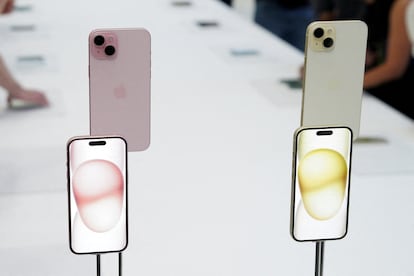The United States takes aim at Big Tech
With the Apple lawsuit, the government has taken a new step in its court battles against the monopolistic practices of major companies. But the latter are already focusing on how to dominate the next big emerging field: artificial intelligence


Big technology companies are the new monopolies. Apple has cornered the smartphone market; Google has no rival in online searches and digital advertising. Amazon dominates e-commerce, Microsoft rules over operating systems and Meta has a privileged position in social networking with Facebook, Instagram and WhatsApp. The U.S. government considers that these companies have abused their dominant position and it has launched a legal battle against their monopolistic practices. The battle is underway in the courts, but in the meantime, those giants, now joined by Nvidia with its high-power microprocessors, have set their sights on a new quest to control the technology of the future (and part of the present): artificial intelligence.
The latest move by the Biden administration was the filing last Thursday of a lawsuit that accuses Apple of illegally building a monopoly with the iPhone. The move caused the company to lose about $110 billion in stock market value in a single day. “The Department of Justice has an enduring legacy, taking on the biggest and toughest monopolies in history. This includes landmark cases against Standard Oil, AT&T and Microsoft,” said Jonathan Kanter, the prosecutor in charge of the antitrust division, announcing the lawsuit.
The monopolies of the digital age are, however, different from those of the industrial age, as Tom Wheeler, author of the book Techlash, explains. The term is a neologism that reflects the negative reaction to the growing power and influence of Big Tech. Wheeler notes that antitrust laws were based on industrial concepts, and that the challenge of the internet era is that many digital practices are difficult to classify according to standards based on industry assumptions. For example, he notes, while industrial activity focuses on the product per se, digital activity focuses on the data created by the consumption of the product. “An auto manufacturer cannot give away vehicles, for instance, but platforms like Facebook and Google can give away their services as the catnip that allows them to collect the private information of users, which can then be repurposed into revenue,” he explains in his book.
These difficulties have not prevented Washington from launching an offensive against technology companies. The government is attacking from two different fronts: the Department of Justice, with Attorney General Merrick Garland at the helm, and the Federal Trade Commission (FTC), directed by Lina Khan, a scourge of technology who assumed the position in 2021 at only 32 years of age.
The Department of Justice has filed two major lawsuits against Google. The first, launched during Donald Trump’s presidency and taken to trial during Biden’s, accuses the company of abusing its monopoly power in the search engine market, especially with contracts to ensure it is the default search engine of Apple devices, including the iPhone. The second one, which is still being processed, accuses the company of an illegal monopoly in the digital advertising market. In it, it calls for the breakup of Google’s advertising business through divestitures to encourage competition.
It is also the attorney general who has promoted the lawsuit against Apple filed on Thursday. It accuses Apple of protecting its monopoly by putting walls around its ecosystem against super apps (such as WeChat, the gateway to various messaging services, e-commerce and payment methods, among others) and streaming apps in the cloud, especially for video games (which reduce the need for devices as powerful as iPhones). The lawsuit also claims that Apple prevents the iPhone and Apple Watch from being compatible with competing devices, causes messaging services to communicate poorly with Android phones, and hinders digital wallets that are alternatives to its own.
Apple is benefiting “not by improving its own products, but by making those of others worse,” Garland said on Thursday. “The Department of Justice doesn’t have a different standard for the powerful compared to those who are not, it doesn’t have a different standard for the rich compared to the poor,” he said.

Meanwhile, Lina Khan’s FTC sued Meta in 2021, accusing it of reducing competition with the purchase of Instagram and WhatsApp. An earlier complaint formulated during the Trump presidency was rejected on procedural grounds, but a second one is making its way through the legal system and the FTC is hoping it will go to trial this year.
Khan built her prestige with an influential academic article, titled Amazon’s Antitrust Paradox, published by the Yale Law Review, back when she was a law student. Putting her theory into practice, the FTC sued Amazon last year, accusing it of engaging in monopolistic practices aimed at “inflating prices, degrading quality, and stealing innovation from consumers and businesses.”
Wheeler maintains that, beyond the difference between industrial and digital activities, antitrust actions have been decreasing in effectiveness over the last half century. Starting in the Reagan era, he writes in his book, courts began to interpret antitrust laws in terms of their impact on consumers (primarily through prices) rather than their impact on the competitive market. As the market power of dominant digital companies grew, courts’ interpretations of the basic premises of antitrust laws narrowed.
The attorney general, however, is optimistic about the cases that depend on him: the United States normally wins the cases it presents, he said on Thursday. The companies deny that they have engaged in illegal practices.
The United States is not alone in the battle. In fact, in many ways, it lags behind the European Union, which has imposed multibillion-dollar sanctions on Google, Apple and Meta and forced Amazon to change its business practices. In addition, it has approved a Digital Services Act that imposes stricter obligations on large technology companies to prevent them from abusing their dominant position.
Artificial intelligence
Despite the offensive, big technology companies are already immersed in the race to dominate artificial intelligence. And, to do this, as they did in the past, they continue to pull out their checkbook to make acquisitions or reach agreements between giants. Microsoft is a privileged partner of OpenAI. In addition, it has signed on Mustafa Suleyman, one of the founders of DeepMind, along with his team and Inflection’s technology without purchasing the company, in a move that some have seen as designed to avoid the scrutiny of competition authorities. For their part, Google and Amazon have invested in Anthropic, another of the leading firms in artificial intelligence. And while the courts have yet to rule on the agreement between Apple and Google over searches on iPhones, both companies are negotiating an agreement for Apple devices to use Gemini, Google’s artificial intelligence assistant.
“Competition not only protects today’s markets and technologies, but also tomorrow’s innovations,” prosecutor Kanter declared on Thursday. “At the center of the Digital Gilded Age is the same question that arose in the Industrial Gilded Age: Will there be rules for the new economy, and who will make those rules, the people or the powerful?” reflects Wheeler.
Sign up for our weekly newsletter to get more English-language news coverage from EL PAÍS USA Edition
Tu suscripción se está usando en otro dispositivo
¿Quieres añadir otro usuario a tu suscripción?
Si continúas leyendo en este dispositivo, no se podrá leer en el otro.
FlechaTu suscripción se está usando en otro dispositivo y solo puedes acceder a EL PAÍS desde un dispositivo a la vez.
Si quieres compartir tu cuenta, cambia tu suscripción a la modalidad Premium, así podrás añadir otro usuario. Cada uno accederá con su propia cuenta de email, lo que os permitirá personalizar vuestra experiencia en EL PAÍS.
¿Tienes una suscripción de empresa? Accede aquí para contratar más cuentas.
En el caso de no saber quién está usando tu cuenta, te recomendamos cambiar tu contraseña aquí.
Si decides continuar compartiendo tu cuenta, este mensaje se mostrará en tu dispositivo y en el de la otra persona que está usando tu cuenta de forma indefinida, afectando a tu experiencia de lectura. Puedes consultar aquí los términos y condiciones de la suscripción digital.








































